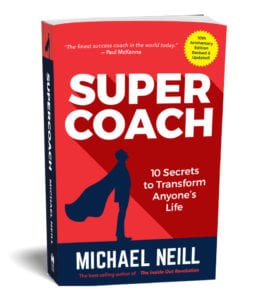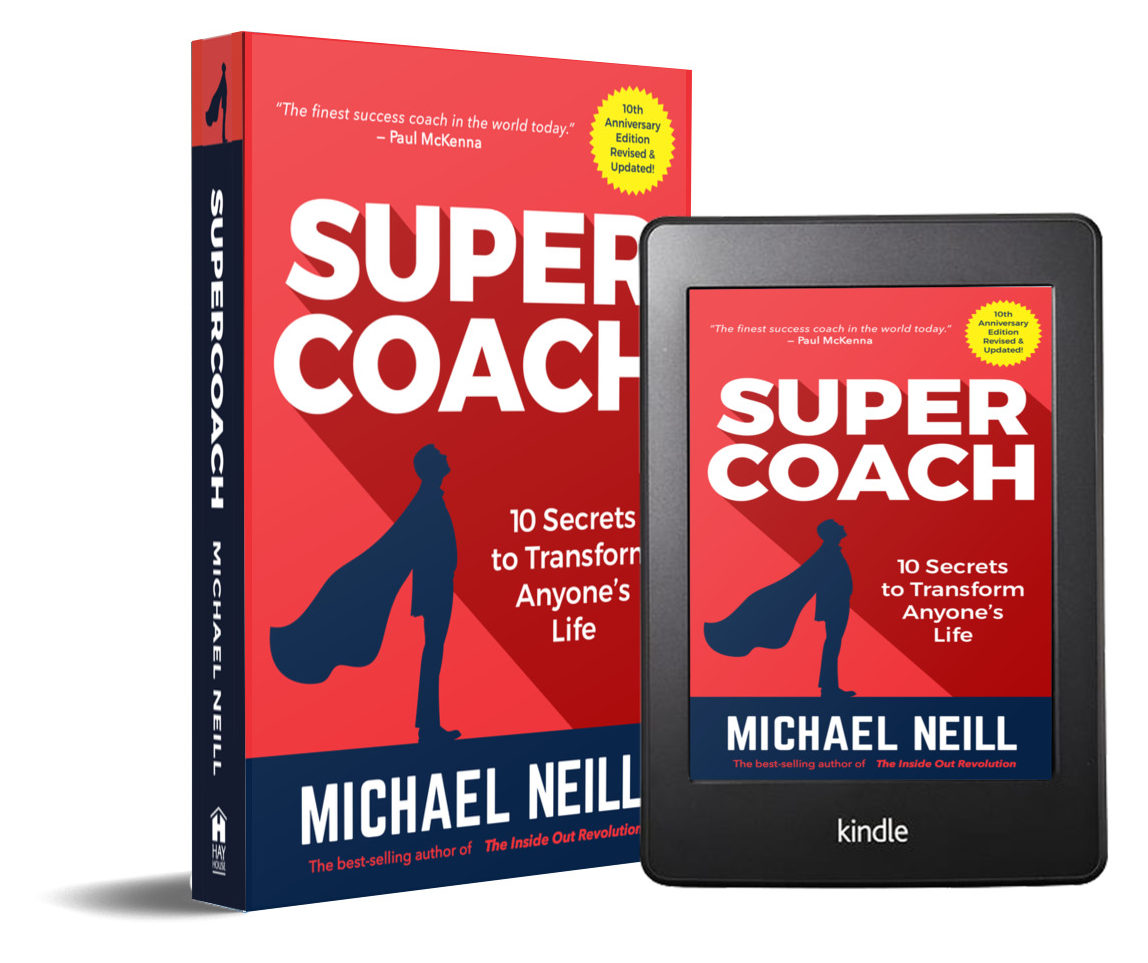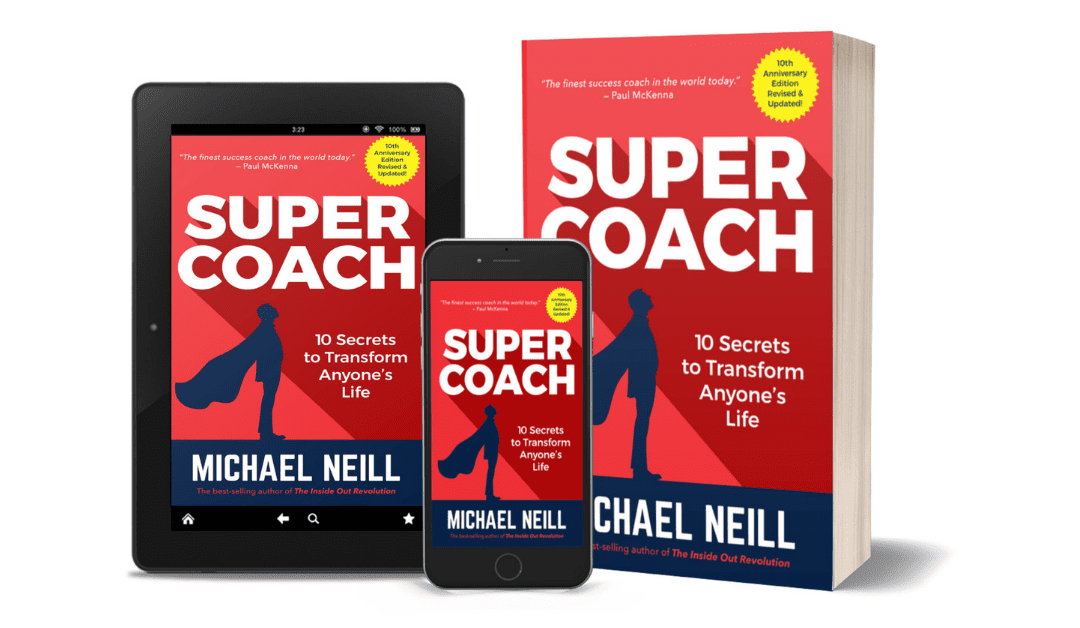
Today’s blog is excerpted from my newest book, a completely revised and updated 10th anniversary edition of Supercoach: 10 Secrets to Transform Anyone’s Life.
To order from Amazon.com, click here.
To order from Amazon.co.uk, click here.
I’ve always suspected that the first official ‘financial’ transaction between nations involved the trade of several chickens for a goat, and that both nations (or what we would today consider to be tribes) had members who violently protested that ‘our chickens are worth way more than their goats’ and vice versa.
Far‐fetched though that may seem, compare it to this brief and highly abridged history of currency in the modern world:
In some ancient Oceanic cultures, conch shells were used to facilitate the exchange of goods and services, as people ‘shelled out’ for food and lodging. Later, workers in the salt mines of Mesopotamia were paid in salt, or salarium, creating the first ‘salaried’ workers and no doubt the first grumblings of comparative salt envy.
As trade grew more complex, and it became completely impractical to carry shells, salt, or even chickens in your purse for barter, precious metals began to be the universal currency, leading to the establishment in the 19th century of the gold standard system that enabled easier international trade.
In the last 70 years, what we call ‘money’ has changed forms again, and the coins and paper we carry around are no longer backed by gold but rather by faith – our faith in the government’s ability to continue to back our currency at a comparable level to other governments’ ability to back theirs.
So, if what we use as money has progressed over time from chickens to shells to salt to gold to faith, what exactly is this money stuff that seems to have everyone all worked up?
Well, one answer is ‘Whatever we make it up to be.’ While this is essentially true (see the recent proliferation of cryptocurrencies as a startlingly modern example), it might be useful to create a shared definition, at least for the purposes of our conversation:
Money is a practical tool created to facilitate the exchange of goods and services.
When viewed in this way, much of what we believe and/or worry about money becomes nonsensical.
One of my favorite money/thought experiments involves substituting the word ‘hammer’ (another practical tool) for the word ‘money’ into many of the most limiting beliefs and ideas that are present in our culture.
Here are a few of my favorites…
- The love of hammers is the root of all evil.
- It takes hammers to make hammers.
- Hammers don’t grow on trees.
- Hammers are a corrupting influence in our society.
- He is more important than me because he has more hammers than I do; she is less important than me because she has less hammers than I do.
So, if money is just a tool, where do we place it in our hierarchy of values? How important should money be in our lives?
How do we evaluate the value of a tool?
The answer is surprisingly simple: by its suitability for the job we are using it to do. How valuable is a hammer? If we are looking to pound nails into wood to construct the frame for a house (or stakes into the ground to hold up a tent), incredibly valuable. If we are looking to turn a screw, replace a lightbulb, or get a table at our favorite restaurant, not very valuable at all.
How valuable is a paintbrush? If we want to change the color of a room or forge a copy of our favorite Picasso, indispensable. If we want to learn how to dance or go traveling to the South Seas, utterly useless.
How valuable is money? It depends entirely on what we are trying to use it for.Click To TweetHere are some of the most common things people attempt to use money for, along with a few of my thoughts on the relative value of money as a primary means to that end.
1. To get security
As we’ve seen in the example of the $600 million man, attempting to use money to get security is like trying to use a paperweight to hold down an 800‐pound gorilla. It can seem as though it’s working when the gorilla’s not moving, but it’s not really doing anything at all.
2. To get power and/or freedom
Any time we attempt to create an internal experience (power, freedom, etc.) through external means (accumulating a certain amount of money), we’re bound to struggle because things simply don’t work that way.
There is a famous story of Alexander the Great’s encounter with the ascetic philosopher Diogenes. When Alexander asked Diogenes what he could do for him, Diogenes’ only request was that Alexander step out of his sunlight so he could continue to enjoy the day. So impressed was Alexander by this encounter that he is reported to have said, ‘Truly, were I not Alexander, I would have wished to be Diogenes.’
What did the most powerful man in the world admire about this poor philosopher who lived in a barrel (literally) by the side of a road? He was as free to live his life on his own terms as Alexander himself.
While it is certainly true that you can use your money to influence the actions of others, money cannot ultimately take away the ultimate power within each individual – what Holocaust survivor Viktor Frankl called ‘the last of the human freedoms – the freedom to choose.’
3. To save time
One of the interesting things I’ve learned from my wealthiest clients is that they don’t value money nearly as much as they value time. While many people will spend hours and hours to try and save a few hundred dollars, the wealthy will happily spend hundreds of dollars to save a few hours of time.
4. To get stuff and/or experiences
As we’ve seen in my earlier definition, this is what money was actually designed for: to facilitate the exchange of goods and services. Using money to get experiences (like a great vacation or an amazing seminar) or stuff (like food, clothing, and shelter) is the equivalent of using a hammer to pound a nail.
Which nails in particular you choose to pound (and of course which experiences and stuff you choose to use your money for) is a function of the thinking you have that looks real to you and your attunement to your own inner sense of desire and joy.
5. To get more money
The comedian Jerry Seinfeld used to tell a joke about why he wasn’t an investor:
People always tell me, ‘You should have your money working for you.’ I’ve decided I’ll do the work and let my money relax.
While many people in the current economy could find cause to agree with him, there is no question that one of the ways you know you have mastered money in your life is when a certain portion of your money is working to earn more money for you while you sit back and relax at home.
The only danger in getting too caught up in this investor mindset is that it’s easy to lose sight of what the money is for – that is, why are you seeking to accumulate more money in the first place?
If it’s for greater security, power, or freedom, well, as the disclaimer always says, ‘The value of your investments can go down as well as up and cannot be guaranteed.’
If, on the other hand, it’s to purchase a more diverse set of stuff and experiences for yourself and others and your experience of the creation is a joyous one, well, the more, the merrier.
6. To give hope, opportunity, and the chance of a better life
Most books I have read on charity or philanthropy talk about the value of giving of yourself, rather than of your money. While there is no doubt that giving of your time, energy, and attention can be a wonderful gift to both yourself and your community, what nobody ever talks about is how much fun it is to put your money to use, even if you don’t yet have very much of it.
Each December when the kids were little, we would give them money with the instruction that they should find a way to use it that would create a better world for others. One year 14‐year‐old Oliver used his to support breast cancer research, 11‐year‐old Clara used hers to support a children’s hospital, and six‐year‐old Maisy split hers between a charity that prevented cruelty to animals and one that built schools in impoverished areas, because she couldn’t believe there were kids who didn’t have the chance to go to school.
Over the years my family and I have given away as little as $10 to feed a hungry child and so much to one organization that they thought we were joking, but in both cases the fun we had doing it and the sense of contribution it engendered were the same.
So, whether you’re struggling to make ends meet or pretending you don’t have 10 years’ worth of savings put by and need to continue to struggle, consider borrowing this line I wrote on the back of my checkbook nearly 20 years ago:
A portion of all I earn is mine to give away.
With all my love,
![]()

To order from Amazon.com, click here.
To order from Amazon.co.uk, click here.
To sign up for the self-coaching program, click here.






